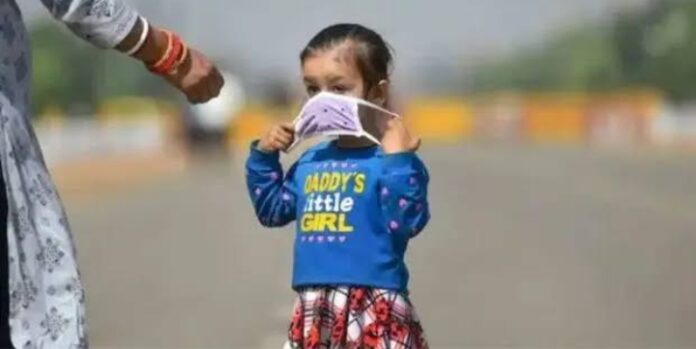India recorded the greatest increase in the world in the number of children not receiving a first dose of diphtheria-tetanus-pertussis combined vaccine in 2020, the UN has said, noting with concern that 23 million children globally missed out on basic vaccines through routine immunisation services last year due to disruptions caused by COVID-19.Data from the World Health Organisation (WHO) and the UN children”s agency UNICEF showed that 23 million children missed out on basic childhood vaccines through routine health services in 2020, the highest number since 2009 and 3.7 million more than in 2019.This latest set of comprehensive worldwide childhood immunisation figures, the first official figures to reflect global service disruptions due to COVID-19, show a majority of countries last year experienced drops in childhood vaccination rates.”Concerningly, most of these – up to 17 million children – likely did not receive a single vaccine during the year, widening already immense inequities in vaccine access,” it said, adding that most of these children live in communities affected by conflict, in under-served remote places, or in informal or slum settings where they face multiple deprivations including limited access to basic health and key social services.”Even as countries clamour to get their hands on COVID-19 vaccines, we have gone backwards on other vaccinations, leaving children at risk from devastating but preventable diseases like measles, polio or meningitis,” said Dr Tedros Adhanom Ghebreyesus, WHO Director-General.”Multiple disease outbreaks would be catastrophic for communities and health systems already battling COVID-19, making it more urgent than ever to invest in childhood vaccination and ensure every child is reached,” he said.India recorded the greatest increase in the world in children not receiving a first dose of diphtheria-tetanus-pertussis combined vaccine (DTP-1). In 2019, 1.4 million children in India did not receive the first dose of the DTP-1 vaccine and this number rose to 3 million in 2020, the UN said.”India is experiencing a particularly large drop, with DTP-3 coverage falling from 91 per cent to 85 per cent,” the agencies said.They added that disruptions in immunisation services were widespread in 2020, with the WHO Southeast Asian and Eastern Mediterranean Regions most affected.”As access to health services and immunisation outreach were curtailed, the number of children not receiving even their very first vaccinations increased in all regions,” they said.As compared with 2019, 3.5 million more children missed their first dose of diphtheria, tetanus and pertussis vaccine (DTP-1), while 3 million more children missed their first measles dose.”This evidence should be a clear warning – the COVID-19 pandemic and related disruptions cost us valuable ground we cannot afford to lose – and the consequences will be paid in the lives and well being of the most vulnerable,” said Henrietta Fore, UNICEF Executive Director.”Even before the pandemic, there were worrying signs that we were beginning to lose ground in the fight to immunise children against preventable child illness, including with the widespread measles outbreaks two years ago. The pandemic has made a bad situation worse. With the equitable distribution of COVID-19 vaccines at the forefront of everyone’s minds, we must remember that vaccine distribution has always been inequitable, but it does not have to be,” Fore said.CEO of Gavi, the Vaccine Alliance, Seth Berkley said these are alarming numbers, suggesting the pandemic is unravelling years of progress in routine immunisation and exposing millions of children to deadly, preventable diseases.”This is a wake-up call – we cannot allow a legacy of COVID-19 to be the resurgence of measles, polio and other killers. We all need to work together to help countries both defeat COVID-19, by ensuring global, equitable access to vaccines, and get routine immunisation programmes back on track. The future health and wellbeing of millions of children and their communities across the globe depends on it.”The UN agencies said that even prior to the COVID-19 pandemic, global childhood vaccination rates against diphtheria, tetanus, pertussis, measles and polio had stalled for several years at around 86 per cent. This rate is well below the 95 per cent recommended by WHO to protect against measles -often the first disease to resurge when children are not reached with vaccines – and insufficient to stop other vaccine-preventable diseases.”With many resources and personnel diverted to support the COVID-19 response, there have been significant disruptions to immunisation service provision in many parts of the world. In some countries, clinics have been closed or hours reduced, while people may have been reluctant to seek healthcare because of fear of transmission or have experienced challenges reaching services due to lockdown measures and transportation disruptions,” they said.As countries work to recover lost ground due to COVID-19 related disruptions, UNICEF, WHO and partners like Gavi, the Vaccine Alliance are supporting efforts to strengthen immunisation systems by restoring services and vaccination campaigns so countries can safely deliver routine immunisation programmes during the COVID-19 pandemic and helping health workers and community leaders communicate actively with caregivers to explain the importance of vaccinations.The agencies are working with countries and partners to deliver the ambitious targets of the global Immunisation Agenda 2030, which aims to achieve 90 per cent coverage for essential childhood vaccines; halve the number of entirely unvaccinated, or ‘zero dose’ children, and increase the uptake of newer lifesaving vaccines such as rotavirus or pneumococcus in low and middle-income countries, they said in a statement.
Home Jammu Kashmir India records greatest increase in number of children not receiving first dose...


